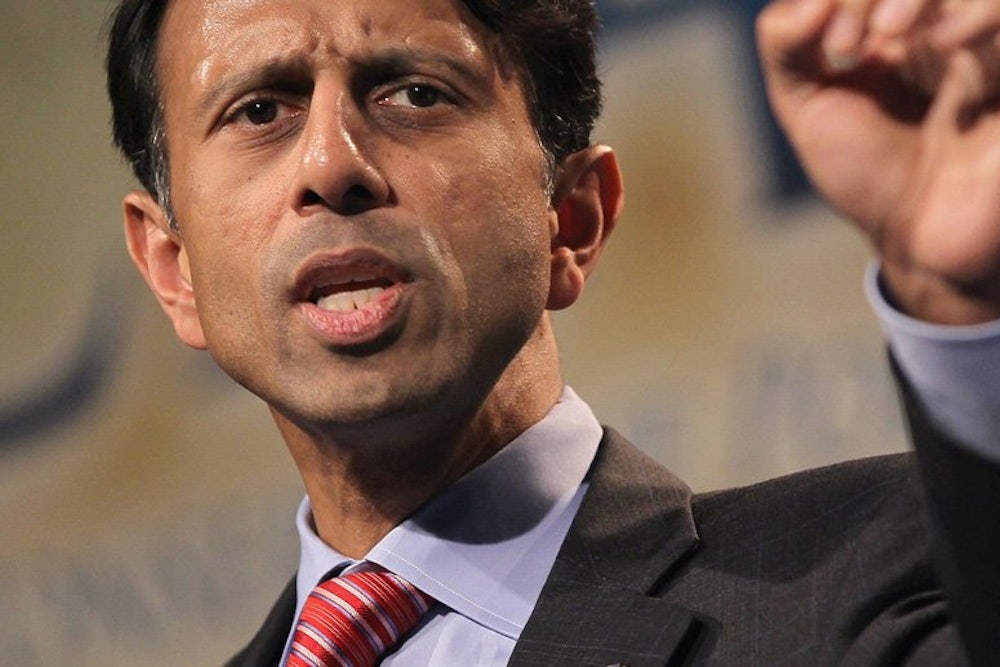Republicans are clearly in the early stages of what will be an extended and difficult effort to redefine their party. But they will soon have to make some fundamental choices about the direction of that evolution. And the terrain for those fateful choices, it's increasingly clear, will be this year's battle over the federal budget.
In a wide-ranging and fiery speech to the Republican National Committee last month, Louisiana governor (and likely contender for the 2016 Republican presidential nomination) Bobby Jindal urged his party to change course. While media attention focused on his comment that “We must stop being the stupid party” (widely interpreted as a plea for Republicans to stop talking about rape), the thrust of his speech lay elsewhere. Republicans, he said, “must not become the party of austerity. We must become the party of growth.”
Jindal backed up his emphasis on growth by calling on conservatives to abandon their “obsession with government bookkeeping.” Here’s how he put it: “We think that if we can just unite behind a proposal to cut the deficit and debt, if we can just put together a spreadsheet and a power point and a TV ad, all will be well.” But this orthodoxy is wrong: “We as Republicans have to accept that government number crunching—even conservative number crunching—is not the answer to our nation’s problems.” Not only is it substantively inadequate, it is politically self-defeating: “This is a rigged game, and it is the wrong game for us to play.”
Jindal’s not so subtle message: While Paul Ryan is a decent and honorable man, his strategy is leading his party into a political cul de sac. And unless we abandon it, we’ll keep on losing. Instead, let’s reclaim the optimistic, pro-growth mantle of Jack Kemp. Oh, by the way, if that’s what you’re looking for, I’m your guy.
Meanwhile, the House Republicans are marching in the opposite direction. In return for the fiscal cliff deal that raised taxes on wealthy Americans without cutting spending, Speaker John Boehner had to promise restive conservatives that the 2014 budget resolution due on April 15 would balance the budget in ten years without any more tax increases.
The most recent CBO budget outlook enables us to see just what that would mean. And the arithmetic underscores Jindal’s point.
According to CBO’s baseline projections, the FY2023 deficit will be nearly one trillion dollars—$978 billion, to be precise. But CBO’s baseline, which is required to mirror current law, makes some assumptions that may turn out to be contrary to fact. Three are crucial: the budget cuts determined by sequestration will go into effect and remain in place for ten years; the reimbursement rate for Medicare providers will be allowed to fall steeply for nine years, starting on October 1; and the many temporary tax provisions extended for a year under the fiscal cliff agreement will be allowed to expire en masse at the end of the current fiscal year. If these three things don’t happen, the cumulative ten-year deficit would rise by more than $2.5 trillion, and the deficit in 2023 would be $1.307 trillion—about $300 billion more than under the baseline.
To make Paul Ryan’s job easier, let’s assume that he and his Republican colleagues are willing to swallow these three assumptions. To get to balance in 2023, they would still have to find spending cuts for that year of about $800 billion. (Interest savings would close the gap between that figure and the projected deficit of $978 billion.) Excluding payments on the debt, outlays for 2023 are about $5.1 trillion, so an across-the-board cut of 16 percent would do the trick.
But Ryan has already ruled out that approach by pledging that today’s Social Security and Medicare recipients, and prospective beneficiaries over age 55, would be held harmless. According to CBO, outlays for those two programs alone would be $2.5 trillion in 2023, nearly half the total. So either Ryan would have to break his promise, igniting an immediate political firestorm, or he would have to cut the remaining portion of the budget by more than 30 percent. Remember, those cuts would come on top of sequestration, which is already scheduled to reduce discretionary spending from 7.6 percent of GDP in 2013 to 5.5 percent in 2023—the lowest share ever recorded since modern record-keeping began more than fifty years ago. And remember also that this 5.5 percent would have to cover both defense and all the domestic programs for which Congress must pass annual appropriations.
This will not happen. And pretending that it will, as House Republicans are now committed to doing, will come at an unaffordable political price—just as Jindal insists.
That is not to say that Jindal’s alternative makes sense either. He assumes that some unspecified deus ex machina will solve the long-term fiscal challenge without any Republican participation. And here’s his prescription for conducting our nation’s business: “If it’s worth doing, block grant it to the states.” That would certainly give the Constitution’s “well regulated militia” a new lease on life—to say nothing of fifty states managing their own versions of Social Security and health insurance.
So we have two competing fantasies—Ryan’s damn-the-torpedoes austerity and Jindal’s madcap devolution. Whatever a nationally competitive Republican Party may be, it won’t be either of those.
